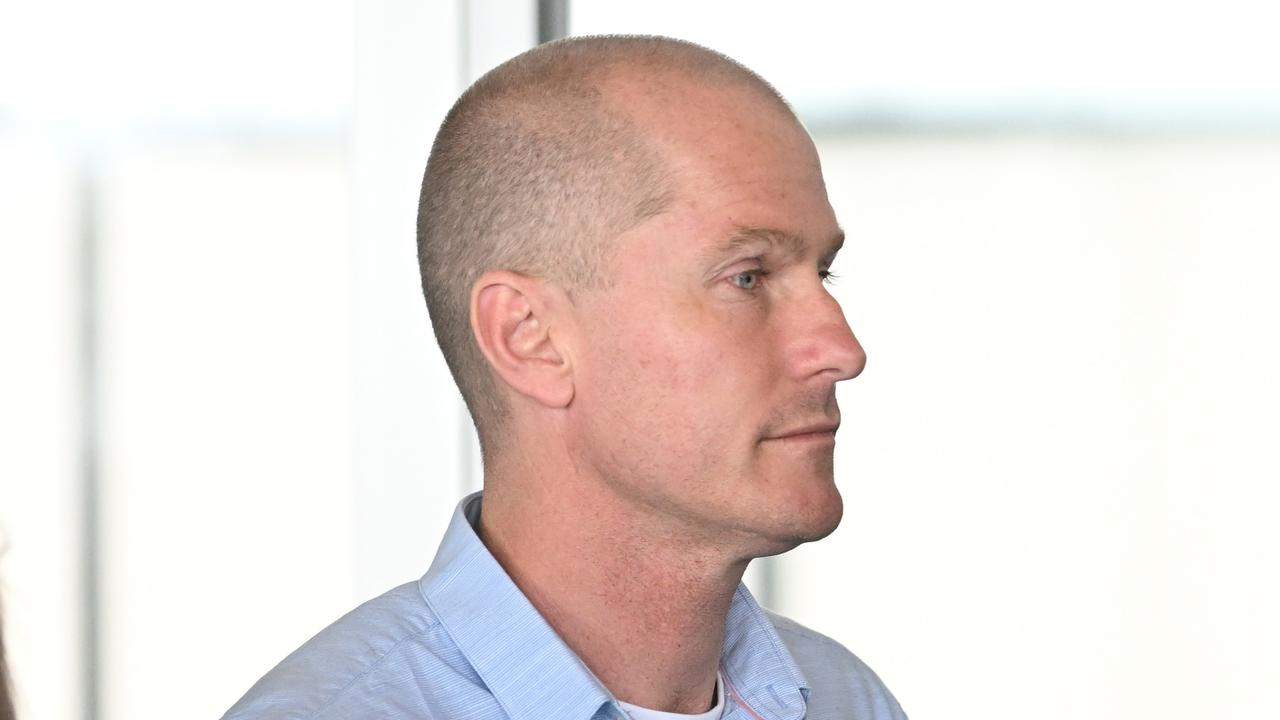‘They all had to grow up fast’: One of Bodhi’s siblings donated bone marrow, others care for him as he faces childhood dementia
Victorian eight-year-old Bodhi Wethers is one of just 200 children in the world with a cruel, genetic disease that causes dementia. This is how his rural family copes.
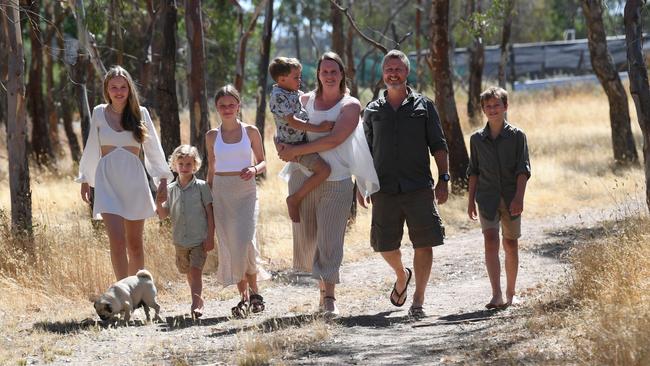
News
Don't miss out on the headlines from News. Followed categories will be added to My News.
Bodhi Wethers is just eight and has dementia. One of only 200 children in the world known to be inflicted with a cruel genetic disease causing cognitive decline, little Bodhi’s aggression, anxiety, “tantrums and meltdowns” are part of daily life for his loving family.
But parents Belinda and Tim Wethers have always been able to count on their other four children to help with Bodhi’s care.
One sister, Billie, 14, has donated her bone marrow to Bodhi to try and stave off his regression, while eldest sister Charlie, 16, is frequently his chaperone, carer and a comforting presence.
At just 15, Charlie was charged with routinely taking her younger siblings to Melbourne to visit Bodhi and mum Belinda at the Royal Children’s Hospital on public transport, while dad Tim stayed home to look after the family farm.
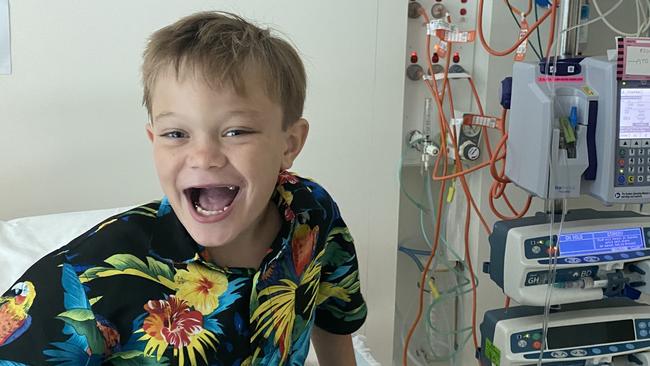
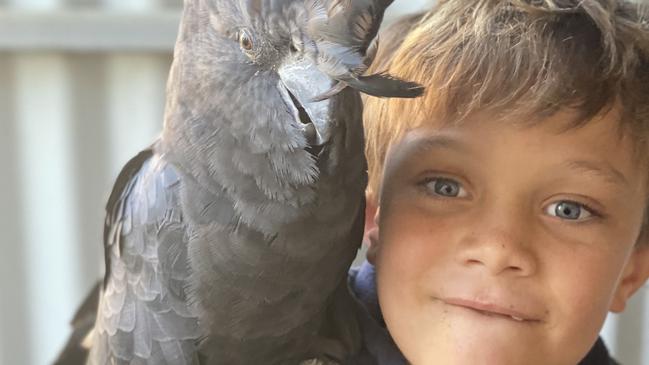
For a country girl from the foothills of the Grampians, the nearly 250km trip with younger siblings in tow, was a big ask.
Charlie also helps care for Bodhi by taking him for walks, bathing him, providing medication, changing him, cooking and calming him down when he is anxious.
“I cuddle him a lot,” she said.
Other siblings Dusty, 12 and Tully, seven, also “step up to the plate” by distracting, entertaining or watching over their brother, in what is often volatile and heartbreaking circumstances.
“All the kids care for and help out with Bodhi, even the younger ones, sometimes just by taking him out on the lawnmower for a couple of hours to give me a break or spending time with him . . . they’ve all had to grow up pretty quickly,” Belinda said.
There is also “a village of support” in the small Lake Fyans community, near Halls Gaps.
Bodhi’s diagnosis at age six-and-a-half with Alpha-mannosidosis — one of the world’s rarest and most devastating childhood degenerative diseases — was a long time coming.
Instinct told Belinda and Tim something was very wrong with their fourth child, despite repeated reassurance from medical professionals there was no cause for concern.
With other children and Belinda a school principal, the couple were certainly not novices when it came to kids’ behaviour and milestones, so when Bodhi never crawled, was late to walk, wasn’t talking, showed signs of deafness and a raft of behavioural, learning and health issues, they started searching for reasons.
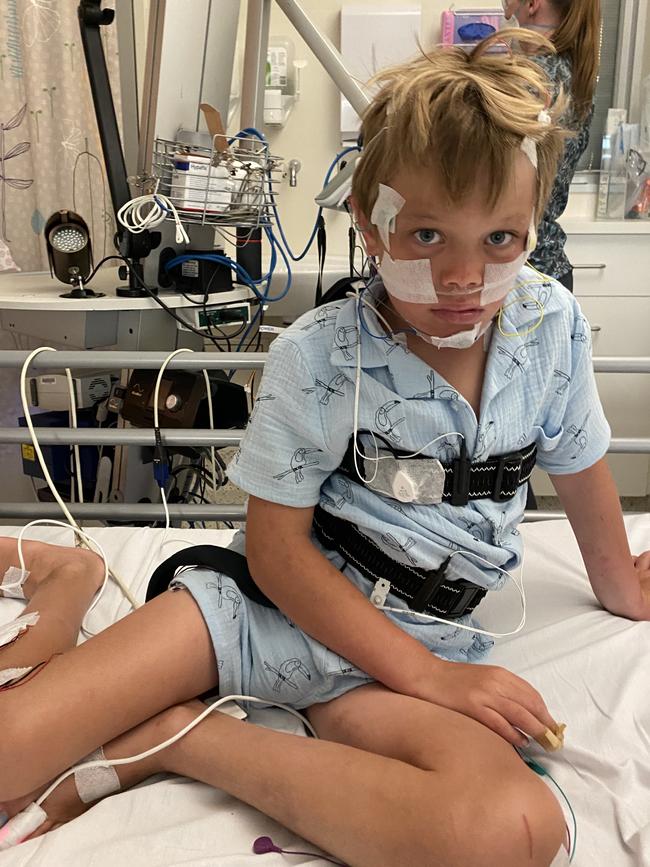
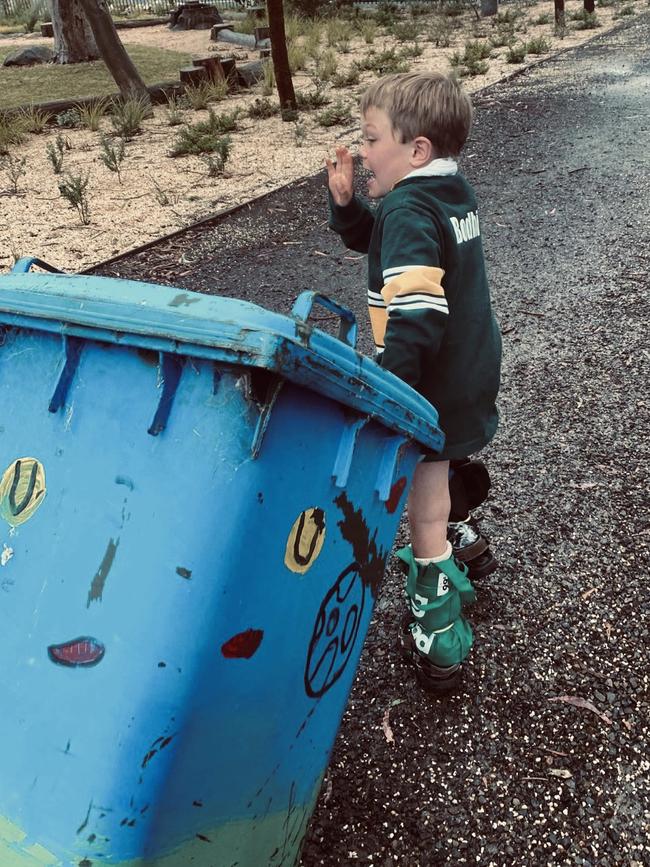
From a young age Bodhi had been individually diagnosed with everything from hip dysplasia, to hearing loss, to global learning delay — but the dots had never been joined.
“None of the results gave us the why . . . just labels for his symptoms,” Belinda said.
The diagnosis, when it finally came on June 20, 2021, was almost a relief for the family, explaining not only Bodhi’s intellectual and physical disabilities but also his extreme behaviour and tendency to become fixated on things — garbage trucks and rubbish bins chief among them.
“I guess by the time we found out, we had probably already grieved quite a lot because we knew that it was going to be something really bad . . . but it still took a little while to process ... there’s only one other patient at the (Melbourne) Royal Children’s Hospital with Alpha-mannosidosis, so there’s very little known about it in Australia,” Belinda said.
The Wethers now know autism, ADHD, oppositional defiance and conduct disorder are among the disease’s many manifestations.
After reading an article in the Herald Sun on another rare genetic disorder called Sanfillipo Syndrome that fitted not only Bodhi’s symptoms but also his physical characteristics, they had feared his prognosis could have been even worse.
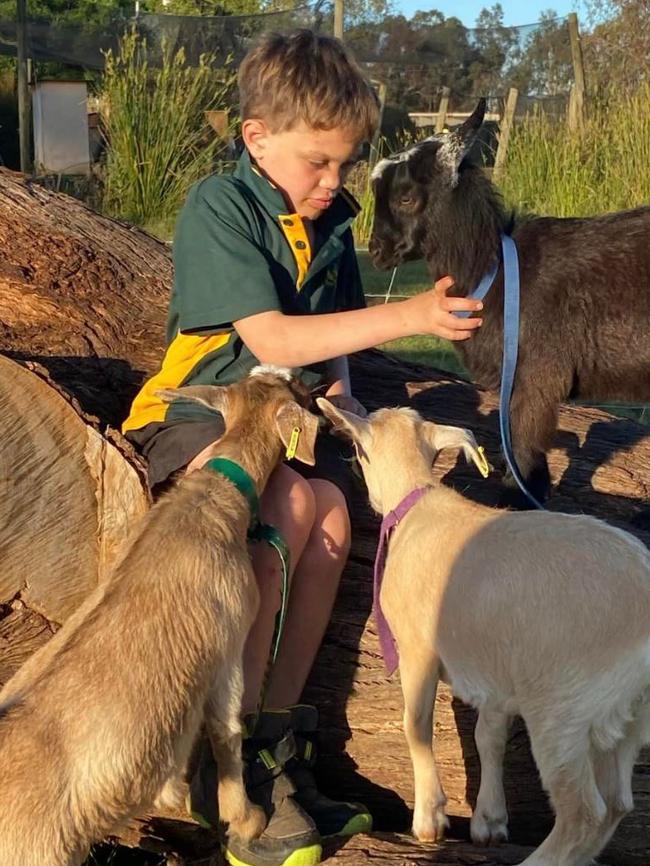
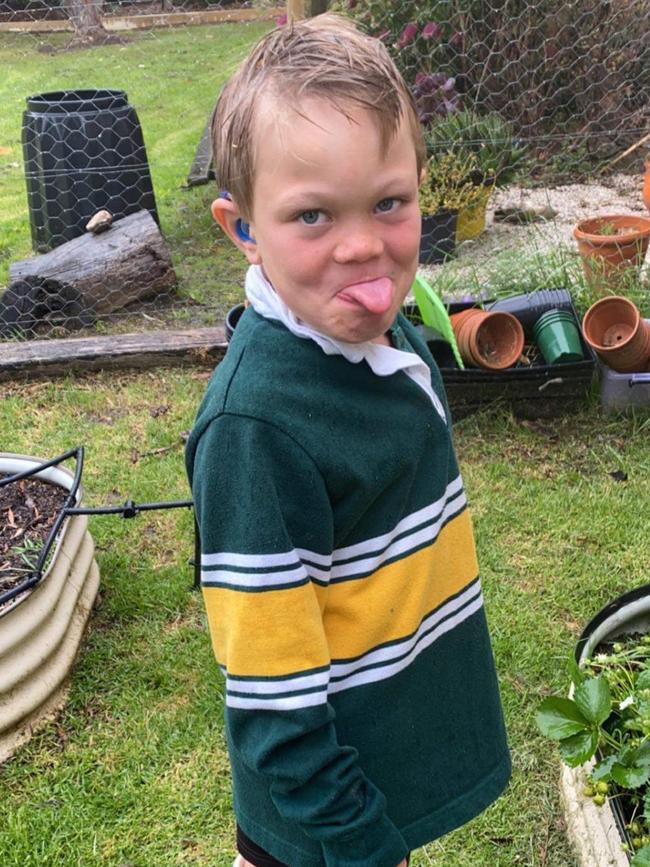
It was that article that saw the Wethers reach out internationally to experts and other families with children displaying similar symptoms, and set them on the course of genetic testing that finally delivered Bodhi’s diagnosis.
“We felt a bit relieved in that there appeared to be a little bit of hope in a bone marrow transplant for Bodhi ... we came across a family in New Zealand that put us in contact with the Royal Children’s oncology unit and we sent an email to the oncologists, and it pretty much went from there,” Belinda said.
Billie was found to be a perfect bone marrow match for Bodhi, meaning she also carries the genes for Alpha-mannosidosis, as do both her parents.
The teenager donated her bone marrow to her brother, in the short window he had for the procedure to stabilise his condition and extend his life.
The Wethers are convinced the transplant has helped, as Bodhi has since developed some new skills including learning to ride a tricycle and using a toilet.
But life with Bodhi is rarely easy.
Just recently he caused a fire while trying to use the kitchen microwave, is drawn to animals and any garbage truck he sees, and has little awareness of his physical safety.
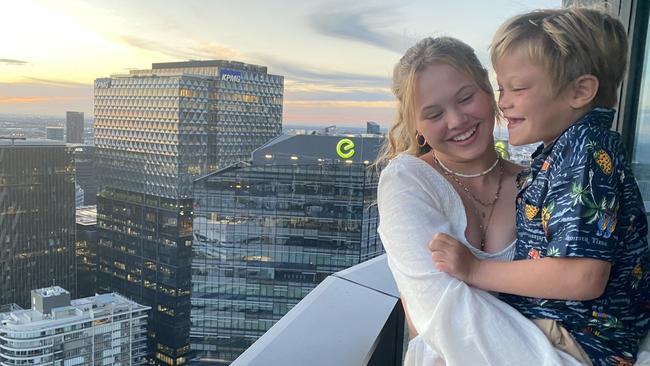
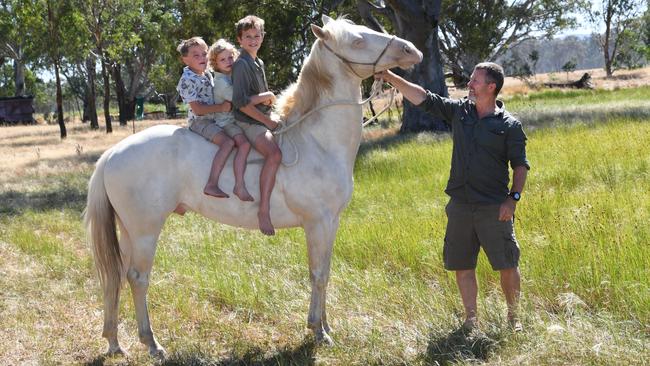
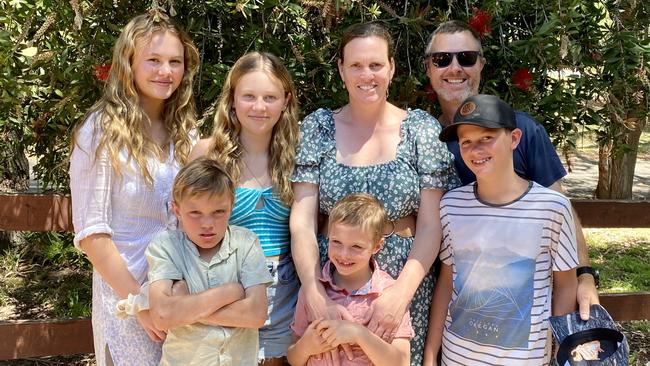
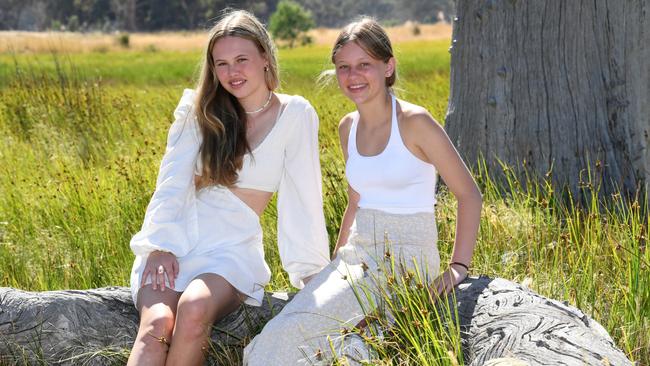
To sleep, he needs one of his pet pug dogs in bed with him and if he wants something then and there, he cannot be dissuaded.
Without his tribe watching over him, and each other, Bodhi would be at risk.
That dedication has recently earnt Charlie a federal government Young Carer Bursary grant, that provides financial support to young people so they can continue their education while they provide unpaid care to family members or friends.
Bodhi attends small Pomonal Primary School, where Belinda is principal and he has been embraced by the students — especially when he takes his chooks to school.
“If Bodhi wants to herd chickens up at school, the other students get in and help him,” Belinda said. “They are wonderful with him.”
Bodhi is most relaxed, however, on the family farm, among its menagerie of black nose sheep, rare birds, miniature goats, chickens, ducks and dogs.
The family’s three huge Maremma livestock protection dogs - bred to live among and care for a flock - are also Bodhi’s keepers.
“They have been amazing at keeping track of Bodhi over the years. When he was younger, wherever he would go, the dogs would just follow,” Belinda said.
“One time there were wild emus that came on to our property and the dogs just kept working together, shepherding and shepherding Bodhi back away from them, keeping him safe.”
What is alpha-mannosidosis?
A disease caused by an ineffective enzyme responsible for breaking down a specific sugar molecule, resulting in waste matter being built up in the body and causing destruction in various aspects of the body and causing a long-term decline in many body parts.
This can cause:
Cognitive decline
Behaviour issues caused by the mental decline
Hearing loss
Narrow weak and fragile bones that can also be more susceptible to bone infections and breaks
Cognitive decline
Stiff joints and muscle weakness which often results in patients ending up in wheelchairs
Very poor immune systems (chest infections, ear infections are common),
Fluid on the brain which can exacerbate hearing loss and mental decline further
Cloudiness of the eyes that requires corrective surgery to retain sight
About the young carer bursary
As families seek to minimise costs, more young people are taking up a carer role for friends and family. The $6m Commonwealth government Young Carer Bursary program provides added financial aid and support to young people so they can continue with their education and reduce their need to undertake paid work at the same time as their study and caring duties.
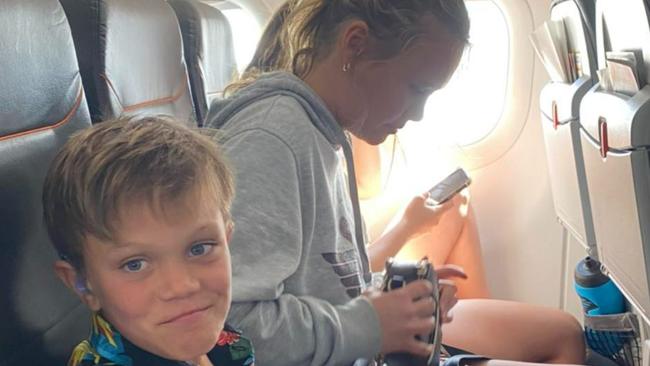
The Young Carer Bursary will offer 1592 grants nationwide, with each grant providing a young carer with up to $3,768 to assist them with the costs of education in the 2024 academic year. With high inflation on groceries and bills, soaring rents, a housing crisis and low wages growth, funding is vital to help to support these young people to carry out their essential carer roles.
Applications for the 2024 Young Carer Bursary Program will be open from July 18 to September 12, 2023. More information can be found at https://youngcarersnetwork.com.au/bursary/young-carer-bursary/
More Coverage
Originally published as ‘They all had to grow up fast’: One of Bodhi’s siblings donated bone marrow, others care for him as he faces childhood dementia




